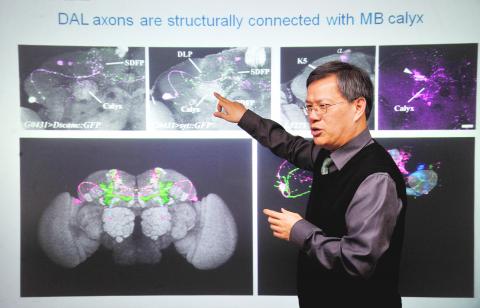Taiwanese scientists have made potential inroads in decoding how the human brain formulates long-term memories — by conducting experiments on the brains of fruit flies.
A research team led by Chiang Ann-shyn (江安世), a professor of life sciences and director of National Tsing Hua University’s Brain Research Center, reported the results of its seven-year study at the National Science Council yesterday.
The results were also published in an article in this month’s issue of Science.

Photo: CNA
“Neuroscientists have always wanted to understand how learning and memory are stored in the brain. Where does a new experience first occur in the brain? And how do these fresh experiences transform into stable long-term memories?” Chiang said.
Fruit flies and humans have many similar behavioral patterns, such as learning, memory, attention and environmental exploration, which are modulated by similar genes, Chiang said. However, the neural network of fruit flies, with about 100,000 neurons, is far less complicated than that of humans, which has about 100 billion neurons.
Chiang said previous research showed that long-term memory was dependent on the synthesis of new proteins in brain cells, so the team focused on finding in which cells long-term memories are formed.
Long-term memory depends on repetitive learning with intervals of rest, so the experiments were conducted by putting the fruit flies through repetitive training procedures, he said.
Using a new tool to visualize the synthesis of new proteins in living flies, the researchers — Chen Chun-chao (陳俊朝), Wu Jie-kai (吳介凱), Lin Hsuan-wen (林萱文) and others — repeatedly screened thousands of individual neurons and found that long-term memory was impaired after inhibiting protein synthesis in only two cell types — the dorsal-anterior-lateral (DAL) neurons.
The discovery has overthrown the previous belief that long-term memory is formed in the corpora pedunculata, or mushroom body, part of a fruit fly’s brain.
After doing the same screening work for between 10 and 12 hours a day over a period of about two years, Chen said they were at first surprised and uncertain about their findings and they repeated the experiments several times to ensure they were correct.
Chen said the team believed the entire neuron network of a fly’s brain could be mapped in about one or two years.
It is estimated that between 20 and 30 neurons function similarly to DAL neurons and this knowledge could be used to target similar neurons in the human brain in future research, Chiang said.
However, it still needs to be confirmed whether long-term memory is also formed via new protein synthesis in only a few nodes within the complicated circuit of the human brain, he said.

PRAISE: Japanese visitor Takashi Kubota said the Taiwanese temple architecture images showcased in the AI Art Gallery were the most impressive displays he saw Taiwan does not have an official pavilion at the World Expo in Osaka, Japan, because of its diplomatic predicament, but the government-backed Tech World pavilion is drawing interest with its unique recreations of works by Taiwanese artists. The pavilion features an artificial intelligence (AI)-based art gallery showcasing works of famous Taiwanese artists from the Japanese colonial period using innovative technologies. Among its main simulated displays are Eastern gouache paintings by Chen Chin (陳進), Lin Yu-shan (林玉山) and Kuo Hsueh-hu (郭雪湖), who were the three young Taiwanese painters selected for the East Asian Painting exhibition in 1927. Gouache is a water-based

Taiwan would welcome the return of Honduras as a diplomatic ally if its next president decides to make such a move, Minister of Foreign Affairs Lin Chia-lung (林佳龍) said yesterday. “Of course, we would welcome Honduras if they want to restore diplomatic ties with Taiwan after their elections,” Lin said at a meeting of the legislature’s Foreign Affairs and National Defense Committee, when asked to comment on statements made by two of the three Honduran presidential candidates during the presidential campaign in the Central American country. Taiwan is paying close attention to the region as a whole in the wake of a

A magnitude 4.1 earthquake struck eastern Taiwan's Hualien County at 2:23pm today, according to the Central Weather Administration (CWA). The epicenter of the temblor was 5.4 kilometers northeast of Hualien County Hall, at a depth of 34.9 km, according to the CWA. The earthquake's intensity, which gauges the actual effect of a temblor, was the highest in Hualien County, where it measured 2 on Taiwan's 7-tier intensity scale. The quake also measured an intensity of 1 in Yilan county, Taichung, Nantou County, Changhua County and Yunlin County, the CWA said. There were no immediate reports of damage or injuries.

OFF-TARGET: More than 30,000 participants were expected to take part in the Games next month, but only 6,550 foreign and 19,400 Taiwanese athletes have registered Taipei city councilors yesterday blasted the organizers of next month’s World Masters Games over sudden timetable and venue changes, which they said have caused thousands of participants to back out of the international sporting event, among other organizational issues. They also cited visa delays and political interference by China as reasons many foreign athletes are requesting refunds for the event, to be held from May 17 to 30. Jointly organized by the Taipei and New Taipei City governments, the games have been rocked by numerous controversies since preparations began in 2020. Taipei City Councilor Lin Yen-feng (林延鳳) said yesterday that new measures by